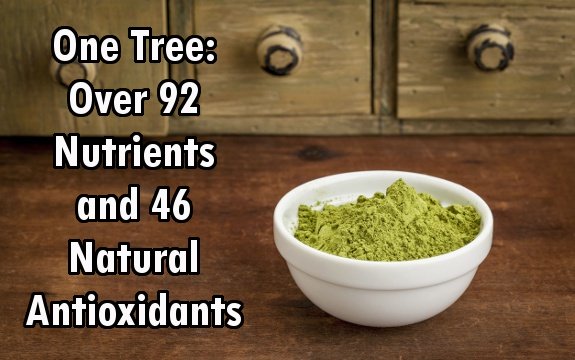One Tree: Over 92 Nutrients and 46 Natural Antioxidants


Moringa oleifera is a tree native to the Himalayas and cultivated throughout the subtropics. Also called the ‘drumstick tree’ due to its odd shape, moringa oleifera grows very well in numerous climate types and offers many health benefits. It has over 92 nutrients and 46 natural antioxidants, as well as anti-inflammatory compounds. A superfood to rival most other superfoods due to its incredible nutritional value, it is also said to treat more than 300 types of disease. The best part – it has no side effects. Moringa is one tree to be extolled for numerous reasons.
For example, one serving of Moringa has more vitamin C than seven oranges, four times the calcium present in milk, and twice the protein as well as three times the amount of potassium found in a single banana. It can reduce free radicals in the body that cause cancer and speed aging, and lower blood pressure due to its high levels of Niacin in the form of A1 and A5 as well as Vitamins B3 and B10. Just 100g of fresh Moringa leaves contain 8.3 g protein, 434 mg calcium, 404 mg potassium, 738 μg vitamin A, and 164 mg vitamin C. Moringa also contains:
Vital Nutrients:
- Vitamin A
- Vitamin B1
- Vitamin B2
- Vitamin B3
- Vitamin B6
- Vitamin B7
- Vitamin C
- Vitamin D
- Vitamin E
- Vitamin K
Read: Health Benefits of Your Favorite Food
Amino Acids:
- Isoleucine – An amino acid that promotes natural energy and brain health.
- Leucine – An amino acid that works with isoleucine to contribute to alertness and high energy.
- Lysine – Helps the bones absorb calcium, helps to create antibodies, regulates hormones, and balances nutrients. Also reduces viral growth and helps to build collagen in bones.
- Methionine – Supplies sulfur to the body, lowers cholesterol, increases the liver’s production of lecithin. It reduces the fat stores in the liver, protects the kidneys, and keeps skin, hair and nails healthy.
- Phenylalanine – Helps the brain’s nerve cells communicate by producing the needed chemicals that support this function. This amino acid reduces hunger pangs, improves memory, and keeps you alert. It also boosts mood.
- Threonine – This amino acid assists metabolism and helps prevent fat from building up in the liver. It also helps the body to digest food and keeps the intestinal tract healthy.
- Tryptophan – This amino acid supports the immune system, lessens depression, and insomnia, and even helps with migraine headaches. It works with lysine to reduce ‘bad’ cholesterol and also reduces arterial spasms which can cause heart attack.
- Valine – Helps to promote a coordinated body and a calm mind.
There are also non-essential amino acids is Moringa, including, alanine, arginine, aspartic acid, cysteine, glycine, histidine, serine, proline, tyrosine, and glutamic acid. These components carry out vital activities in our body from wound healing to immune boosting and cancer tumor suppression, to muscle and tissue growth.
What’s more, the seeds of the Moringa tree are high in an oil full of oleic acid, a beneficial saturated fat also found in olive oil that is wonderful for cosmetic use and boosting overall health. Ancient Egyptians even put vials of Moringa oil in their tombs. It is a potent antioxidant to use in place of other cooking oils as well.
Additional Sources:

And we know it has no side effects how? We’re always hearing this about things that years later end up having side effects. It’s not something that’s ever really known considering the lead times that may be involved.
If you had done any research you would have found that it has been used as a food supplement, as a medicinal potion, a water purifier, cattle fodder, the purest lubricant originally used in fine machinery and for cooking and now in cosmetics. Moringa is the most complete food plant in the world and has been used for centuries in Asia, Middle East, North Africa and the Far East and now in Central American countries. I have been eating it for years and at 82 have no after effects from it.
God made organic plants don’t have side effects! ! They just have effects.
On other hand, anything synthetic or chemical based, has side effects.
That is “malungay” here n the Philippines
I wish you would have referred a good reliable source to purchae Moringa products!
I wanted to share this post on my FB page. But, I don’t see any link over here. Could somebody help me. Thanks.